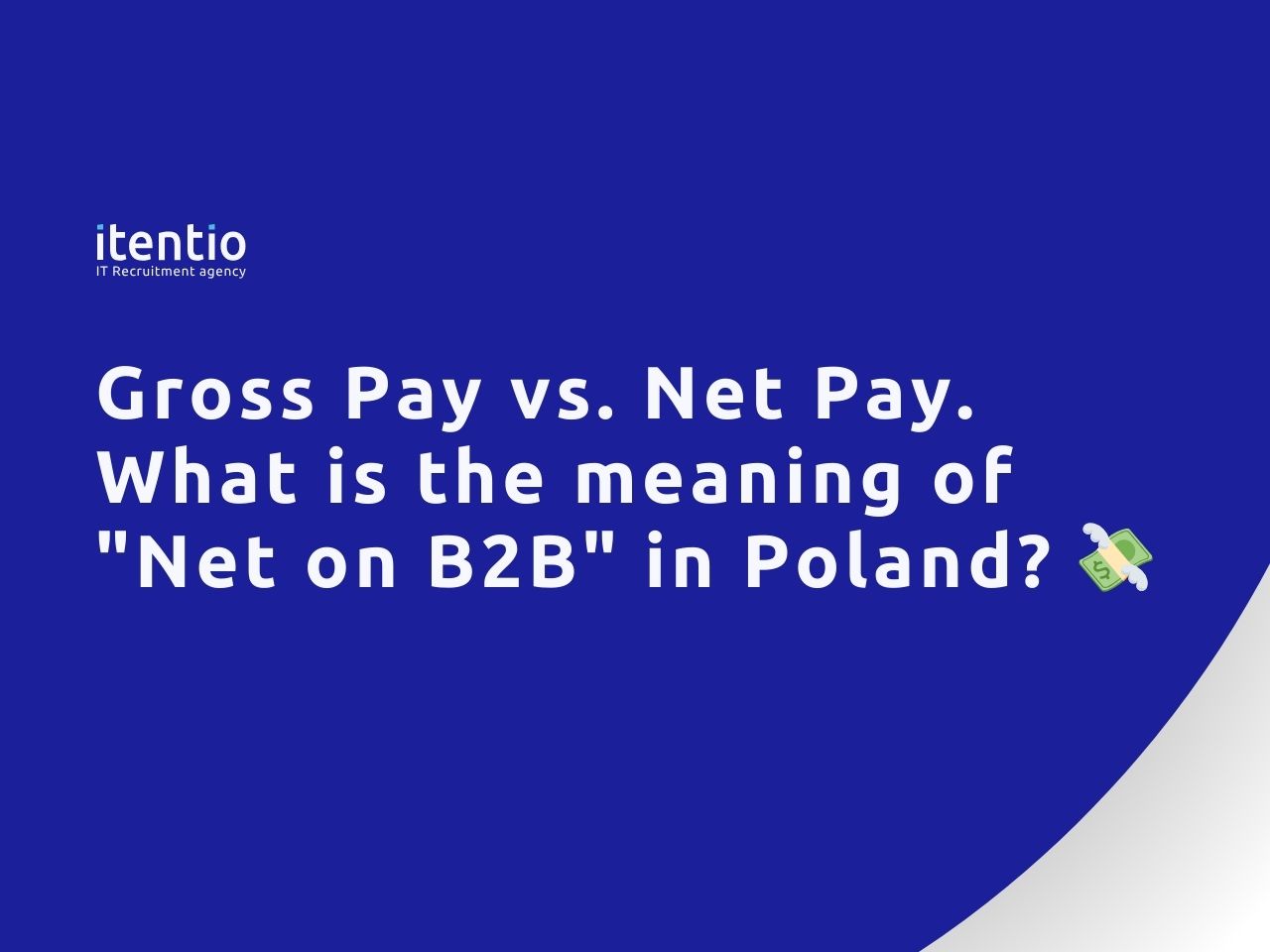When it comes to salary, understanding the difference between gross salary and net pay is essential, as well as understanding “net on B2B” candidates’ request in Poland, where tax structures and employment contracts can be complex. Whether you’re an employee, employer, contractor or freelancer, understanding these distinctions in Poland can help you make informed decisions about your finances.
What is Gross Pay in Poland?
Gross pay refers to the total earnings an employee receives before any deductions are made. This includes base salary, bonuses, overtime pay, and other allowances. In Poland, gross pay (brutto) is often the figure mentioned in job advertisements and employment contracts. However, it is not the amount that ends up in the employee’s bank account.

Components of Gross Pay in Poland
In Poland, the gross pay includes:
- Base Salary: The agreed-upon salary as per the employment contract.
- Bonuses, Benefits and Incentives: Additional earnings based on performance or company profits.
- Allowances: Such as transportation or accommodation allowances, sickness, maternity, care allowance etc.
- Overtime Pay: Compensation for extra hours worked beyond the standard working hours.
In a dedicated article, we discussed Poland’s types of contracts and taxes in details.
What is Net Pay?
Net pay, commonly referred to as “take-home pay,” is the amount an employee receives after all mandatory deductions have been made. These deductions include taxes, social security contributions, and other applicable charges. Net pay is what employees see in their bank accounts after payday.
Deductions Affecting Net Pay in Poland
In Poland, several deductions impact the net pay:
- Income Tax: Progressive tax rates apply depending on income levels.
- Health Insurance and Social Security Contributions: These mandatory deduction contributing to public healthcare services, pension, and disability.
- Labor Fund and Guaranteed Employee Benefits Fund: These are compulsory additional contributions for employment security.
Example: Gross vs. Net Pay Calculation

Let’s consider an example. If an employee’s gross salary is 10,000 PLN per month, their net pay could be significantly lower after all deductions.
Assuming the standard deductions for taxes and social security, the net pay might be slightly over 7,000 PLN, depending on various factors like tax brackets and personal circumstances.
B2B Contracts in Poland: Understanding “Net on B2B”
In Poland, many professionals, particularly in the IT sector, work under B2B (business-to-business) contracts. Unlike traditional employment contracts, B2B agreements are between two businesses — often, one of the parties is a sole proprietorship or a subcontractor. In cases where individuals work remotely for companies without a legal presence in Poland, IT incubators come into play. These third-party service providers handle invoicing on behalf of the individual and offer basic legal support, allowing them to work on a B2B basis without the need to establish a sole proprietorship.
What Does “Net on B2B” Mean?
The term “net on B2B” when it comes to salary in Poland refers to the amount invoiced by the service provider, excluding VAT (Value Added Tax). Essentially, this is the amount the contractor receives after issuing an invoice but before VAT is added. If VAT is included, it would be akin to gross pay in an employment contract. But, in Poland, the sum on the B2B contract can be 10-15 % higher than the stated gross on permanent employment.
Key Features of B2B Contracts in Poland
- VAT Exclusion: The invoice amount is considered “net” before VAT. If VAT (usually 23%) is added, it would represent the gross amount.
- Tax Obligations: Unlike employees, B2B contractors are fully responsible for their tax handling and social security contributions.
- Flexibility: B2B contracts often offer more flexibility in terms of working hours and conditions but come with greater responsibility for financial management.
Example: Net on B2B Calculation in Poland
Imagine a contractor under a B2B contract charges 12,300 PLN (including VAT) as a monthly payment.
The “net on B2B” amount would be 10,000 PLN, excluding the 2,300 PLN VAT.
This 10,000 PLN is the contractor’s revenue before accounting for their tax obligations and expenses (after excluding VAT).
Conclusion
It is crucial to understand the difference between gross and net earnings for anyone working in Poland, whether under traditional employment or a B2B contract. Gross pay represents the total earnings before deductions, while net pay is what you actually receive after all necessary contributions and taxes.
Additionally, in the growing landscape of B2B work in Poland, especially in the IT industry, the concept of “net on B2B” in Poland adds another layer of financial consideration for tech professionals – freelancers and contractors.
By being aware of these differences, IT professionals can better plan their finances and make more informed career decisions in Poland’s vibrant labor market.
Whether you’re an IT professional looking for the perfect B2B opportunity or a tech company in need of top-tier talent, Itentio IT Recruitment is here to connect you with the best talent and opportunities. We specialize in matching skilled professionals with leading companies, ensuring a seamless hiring process for both parties.
Don’t miss out on your next big career move or the ideal candidate!
Contact Us Today to start your journey with our expert team and discover how we can help you achieve your goals. Let’s build the future of tech together!



